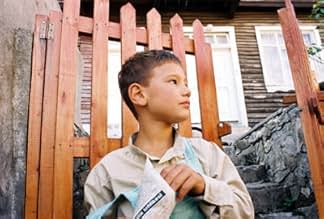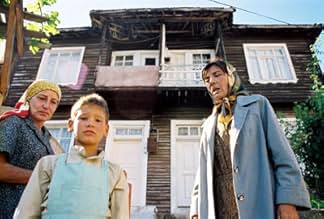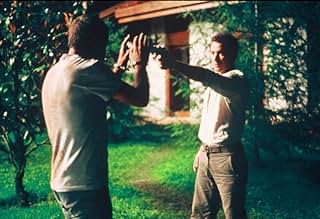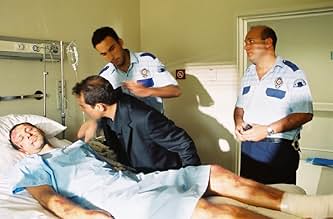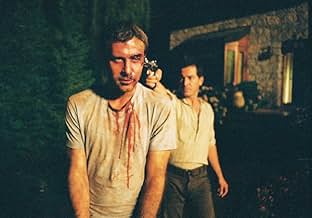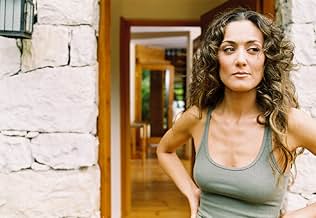Mustafa Hakkinda Hersey
- 2004
- 1 Std. 59 Min.
IMDb-BEWERTUNG
7,5/10
9935
IHRE BEWERTUNG
Füge eine Handlung in deiner Sprache hinzuA Turkish thriller about a man forced to confront his past after he loses everything in an accident.A Turkish thriller about a man forced to confront his past after he loses everything in an accident.A Turkish thriller about a man forced to confront his past after he loses everything in an accident.
- Auszeichnungen
- 5 Gewinne & 8 Nominierungen insgesamt
Arda Seçgün
- Kerem
- (as Arda Secgun)
Handlung
WUSSTEST DU SCHON:
Ausgewählte Rezension
Sometimes it's wise to set aside one's prejudices against a film and consider it on its own merits as a contribution to the knowledge of the society that produces it.
Such is the case with MUSTAFA HAKKINDA HERŞEY (ALL ABOUT MUSTAFA). A Gothic melodrama reveling in its extremities, Çağan Irmak's film in my opinion piles absurdity on absurdity culminating in a sentimental denouement. But perhaps I am looking at it through jaundiced eyes.
The plot is straightforward: Mustafa (Fikret Kuşkan) is a successful businessman with a wife (Başak Köklükkaya) and son (Arda Seçgün) who runs his own film and advertising business. Life seems fairly good to him, although he does seem a little extreme in his reactions, especially during meetings. His wife Ceren dies unexpectedly in a car accident, that sends Mustafa into paroxysms of grief. Later on he discovers that she had had an affair with taxi-driver Fikret (Nejat İsler), so Mustafa determines to wreak revenge by imprisoning Fikret in a lonely house and forcibly extracting the truth from him. As time passes, we learn that Mostafa has had a highly troubled childhood, which explains why he reacts so excessively to the news of his wife's death.
The film is full of lurid sequences using tilted cameras and vivid colors to denote Mustafa's tortured state of mind. While alone with Fikret, he subjects the unfortunate taxi-driver to extreme forms of punishment, often involving S&M, which makes us feel that there is a sexual dimension to his sadism. The film includes tropes familiar from other Çağan Irmak films - the isolated house recalls KAÇAN FIRSATLAR LİMİTED; the sculptures adumbrate TAMAM MİYİZ?, and the sadism recalls KARANLIK TAKİLER. Throughout we are led to believe that Mustafa's behavior can be attributed to his childhood, especially his relationship to his father (who was equally sadistic).
At the same time he is portrayed as a family man with a touching concern for Kerem. This suggests some kind of cathartic desire; once he has exorcised the devil of childhood from his consciousness, he can be somehow released from mental torment. The diabolic aspects of the film are well brought out through the use of fast cutting.
The film does not tell us much about contemporary Turkish society; rather it suggests that human beings have to find their own means of coping with existence. Sometimes they cannot do this, and hence descend into abnormality.
Such is the case with MUSTAFA HAKKINDA HERŞEY (ALL ABOUT MUSTAFA). A Gothic melodrama reveling in its extremities, Çağan Irmak's film in my opinion piles absurdity on absurdity culminating in a sentimental denouement. But perhaps I am looking at it through jaundiced eyes.
The plot is straightforward: Mustafa (Fikret Kuşkan) is a successful businessman with a wife (Başak Köklükkaya) and son (Arda Seçgün) who runs his own film and advertising business. Life seems fairly good to him, although he does seem a little extreme in his reactions, especially during meetings. His wife Ceren dies unexpectedly in a car accident, that sends Mustafa into paroxysms of grief. Later on he discovers that she had had an affair with taxi-driver Fikret (Nejat İsler), so Mustafa determines to wreak revenge by imprisoning Fikret in a lonely house and forcibly extracting the truth from him. As time passes, we learn that Mostafa has had a highly troubled childhood, which explains why he reacts so excessively to the news of his wife's death.
The film is full of lurid sequences using tilted cameras and vivid colors to denote Mustafa's tortured state of mind. While alone with Fikret, he subjects the unfortunate taxi-driver to extreme forms of punishment, often involving S&M, which makes us feel that there is a sexual dimension to his sadism. The film includes tropes familiar from other Çağan Irmak films - the isolated house recalls KAÇAN FIRSATLAR LİMİTED; the sculptures adumbrate TAMAM MİYİZ?, and the sadism recalls KARANLIK TAKİLER. Throughout we are led to believe that Mustafa's behavior can be attributed to his childhood, especially his relationship to his father (who was equally sadistic).
At the same time he is portrayed as a family man with a touching concern for Kerem. This suggests some kind of cathartic desire; once he has exorcised the devil of childhood from his consciousness, he can be somehow released from mental torment. The diabolic aspects of the film are well brought out through the use of fast cutting.
The film does not tell us much about contemporary Turkish society; rather it suggests that human beings have to find their own means of coping with existence. Sometimes they cannot do this, and hence descend into abnormality.
- l_rawjalaurence
- 24. Jan. 2016
- Permalink
Top-Auswahl
Melde dich zum Bewerten an und greife auf die Watchlist für personalisierte Empfehlungen zu.
- How long is Everything About Mustafa?Powered by Alexa
Details
- Erscheinungsdatum
- Herkunftsland
- Offizieller Standort
- Sprache
- Auch bekannt als
- Everything About Mustafa
- Drehorte
- Produktionsfirmen
- Weitere beteiligte Unternehmen bei IMDbPro anzeigen
Box Office
- Weltweiter Bruttoertrag
- 261.085 $
- Laufzeit1 Stunde 59 Minuten
- Farbe
Zu dieser Seite beitragen
Bearbeitung vorschlagen oder fehlenden Inhalt hinzufügen

Oberste Lücke
By what name was Mustafa Hakkinda Hersey (2004) officially released in Canada in English?
Antwort
